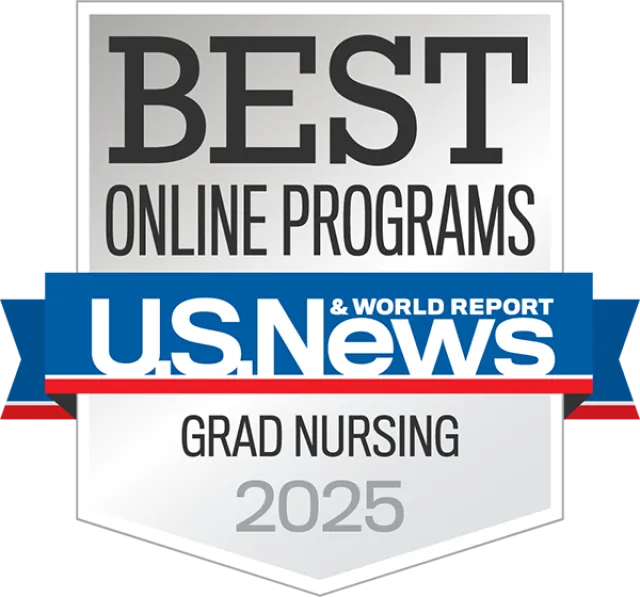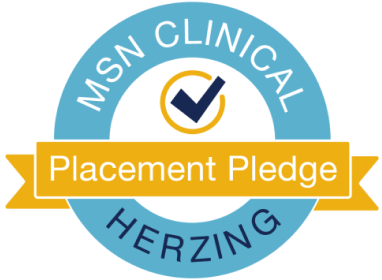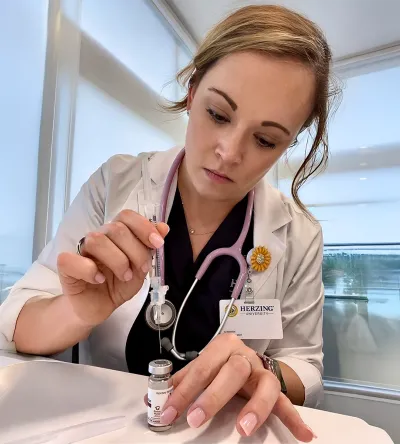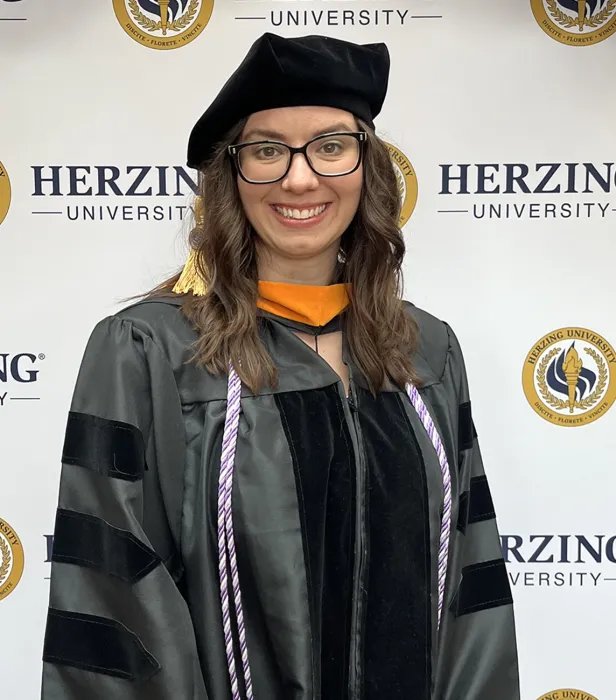Quick facts about our RN to MSN-FNP pathway
| Accreditation | CCNE accredited,1 Accredited by the Higher Learning Commission |
|---|---|
| Our pledge | Herzing pledges your clinical placement |
| Clinicals | 630 total clinical hours with 500 total patient encounters; 64 credits required to graduate from the Accelerated RN to MSN program |
| Format | 100% online coursework with inter-professional educational opportunities |
| Options | Go from ADN to FNP in our accelerated RN to MSN program, or earn your BSN on the way in our RN to BSN to MSN-FNP track |
| Dual credit | Earn dual credit towards a Doctor of Nursing Practice (DNP) |
| QuickPaths | Transfer credit, stackable credentials, and adaptive learning technology build a faster pathway to a higher education with Herzing University |
Learn More Today!

Ranked by U.S. News & World Report as one of the best online graduate nursing programs in 2025
Redefine your career path in nursing: step confidently towards an MSN
The RN to Master of Science in Nursing in Family Nurse Practitioner degree is a 64-credit graduate program (RN to MSN) which prepares you for a career as an FNP.
The online degree program provides students with fundamental knowledge and skills in advanced pathophysiology and pharmacology, health promotion across the life span, adult, geriatric, and pediatric healthcare, and much more.
Career-focused curriculum
Discover the crucial knowledge and skills required to succeed in your work and build a foundation for continued career growth.
Flexible schedule
We work hard to help you maintain school-life balance, striving to be as flexible as possible for busy non-traditional students.
Virtual services
Access to extensive virtual services, including academic advising, tutoring, support services, technical support and library services.
Lifelong support
We support your ongoing career advancement by providing comprehensive, personalized student services with lifelong career coaching.
Rolling admissions
No application deadlines to worry about. Apply when you’re ready and prepare to get started soon.
Your pathway: classes and curriculum details
The Herzing RN to MSN curriculum offers graduate-level nursing coursework as well as career-focused education, from foundational and core courses to valuable clinical experience.
All classes are delivered online with clinicals totaling 630 hours with 500 unique patient encounters.
RN to BSN to MSN-FNP Track
This track combines our online RN to BSN and BSN to MSN-FNP degree programs. You can view their respective curriculums with all course information here:
| Program | Months i | Semester Credits |
|---|---|---|
| Master of Science in Nursing (MSN) in Family Nurse Practitioner - Accelerated RN-MSN (MSNFNPA) | 24 | 64 |
i. Average number of months for students to complete program.
Required Bridge Courses
All courses, 16.00 semester credit hours, are required prior to completing graduate level coursework.
Required Core Courses
All courses, 15.00 semester credit hours, are required.
Required Direct Care Courses
All courses, 9.00 semester credit hours, are required.
Required Specialty Courses
All courses, 24.00 semester credit hours, are required.
+ Chair approval is needed for PMC students to take NU 627 with another clinical course simultaneously.
Clinical Proficiency Exam and Policy
The following modules are 0.00 semester credit hours associated with the policy outlined above. Students are required to take as co-requisite module along with NU 611, NU 642, NU 664 or NU 671, depending on the program of study. Module Number Module Name Semester Credit Hours NSG 0600 Clinical Proficiency Module 0.00 NSG 0600R Clinical Proficiency Remediation Module (if needed) 0.00
Tuition & Cost
Tuition & Cost
The cost of tuition for the RN to MSN-FNP program is $770 per credit.
You can potentially earn even greater savings by transferring credit from prior college coursework, applying for financial aid, or potential partnership opportunities through your employer.
Our goal is your career advancement. That's why we are always working to improve our curriculum and processes to make our program as affordable as possible while preparing you best for success in your work.
Scholarships & Financial Aid
You may be eligible for multiple scholarships and grants—including our Nurses Circle of Achievement scholarship, which offers up to 10% tuition reduction.
Military/Veteran Discounts
Veterans, Active Duty U.S. Servicemembers, and spouses may qualify for a 10-20% tuition discount.

Your Clinical Placement is Our Pledge
We understand securing clinical placement as part of an RN to MSN degree program is one of the biggest concerns students face. At Herzing, we offer guidance and support through our step-by-step Clinical Guidance Process to ensure you can get the clinical practice experiences you need. As a Herzing student, we’ll encourage you to find your own preceptor and clinical sites as there are many benefits to doing so. However, we provide extensive support should you find difficulty along the way. With Herzing, you are never on your own. Because of our strong relationships with healthcare providers across the U.S. and our comprehensive Clinical Guidance Process, we are confident in our ability to help you find clinical placement. So much so that if you are unable to find a clinical site on your own, we pledge to step in and help you secure clinical placement.*
*Subject to terms and conditions outlined in the enrollment documents.
RN to MSN-FNP program enrollment prerequisites
Enrollment requirements are the same whether you choose the accelerated RN to MSN-FNP or RN to BSN to MSN-FNP track. Prerequisites include:
- Live in a state where Herzing University is authorized to offer the RN to MSN program
- Hold a current, active and unrestricted license as a registered nurse (RN) in the same state in which they practice
- Hold an associate degree (ADN/ASN/AASN) in nursing from a nationally or regionally accredited college or university
- Participate in an interview to identify your goals and determine if the program is right for you
Pathways
Choose your path to go from RN to MSN-FNP

RN to BSN to MSN-FNP
Earn your BSN, then work towards a master’s degree in nursing.
- Curriculum built to help you earn a BSN and MSN faster
- How long? 32 months on average
- Earn a bachelor’s degree that may be required by some employers

Accelerated RN to MSN-FNP
Bridge directly from an ADN to FNP in the Herzing Accelerated RN to MSN program.
- Curriculum built to accelerate your MSN-FNP completion
- How long? As few as 2 years (24 months)
- Ideal for nurses looking to advance their practice and leap forward in their career
What Can You Do With an MSN?



Go from RN to FNP and you’ll develop skills to handle patient care across the lifespan under the umbrella of family practice.
After earning your master’s degree, you can qualify to become an important contributor in many different types of settings in patient care:
- Family practice
- Primary care
- Public health
- Retail health clinics
- Acute care
- Psychiatry/mental health
- Urgent care clinics
- Emergency rooms
- Veterans administration
- Women's Health
How can I continue advancing my career?
Nurse practitioners considering an additional credential in teaching or instruction may be interested in a post-master’s certificate in nursing education.
Job Outlook
According to the Bureau of Labor Statistics, employment of nurse practitioners is expected to rise 45% from 2022-2032, far surpassing the average across all U.S. occupations.*
Now is a great time to begin earning the education you need to join a rapidly growing field in healthcare.
Waived Enrollment Fee
Discover the educational pathway designed to maximize your career potential. Reach for greater heights with Herzing University.
Faq
Frequently Asked Questions
Didn't find the answer to your question? Send us an inquiry and we will be happy to answer all your questions!
Completing the Accelerated RN to FNP option with Herzing takes 24 months. If you choose this path you will not earn a BSN.
If you choose to earn your BSN first, you’ll need 12 months to go from RN to BSN, and another 20 months to go from BSN to FNP in our MSN-FNP program—for a total of at least 32 months. If you choose to eventually go from BSN to DNP-FNP, it would take about 44 months (12 + 32).
No. Registered nurses holding an associate degree who enroll in an accelerated RN to MSN (Nurse Practitioner concentration/track) program may skip earning a Bachelor of Science in nursing (BSN) on their way to earning their MSN.
Those who want to become an NP but only have a non-nursing bachelor’s degree may be eligible to enroll in our online Direct Entry MSN program, which makes it possible to earn a master’s degree in nursing in as few as 20 months without earning a BSN on the way.
According to the Bureau of Labor Statistics, nurse practitioners earn an average salary of $132,000 per year ($63.46 per hour). Pay depends on many factors, including your location, what healthcare institution you work for and your level of experience.*
Discover the average nurse practitioner salary by state and find out what nurse practitioners make on average near you.
Nurse practitioners have an expanded scope of practice compared to registered nurses. In addition to RN duties, nurse practitioners may also write prescriptions, order lab tests, diagnose illnesses, and more (although specifics vary by state). NPs have greater autonomy in delivering patient care, and for that reason, the education requirement is higher.
Learn more about how to go from RN to nurse practitioner.
Increasingly yes, but it ultimately depends on the institution who issued the degree.
As the popularity of online degrees continues to rapidly trend upward, so has mainstream acceptance of online degree programs.
Attitudes toward online degrees were already becoming more positive before the COVID-19 pandemic forced the issue. According to a 2019 study from Northeastern University, 61 percent of HR leaders say online learning is “of equal or greater quality to more traditional methods.” More than half believe that in the future, most advanced degrees will be online.
Regarding nursing applicants who earned online degrees, there are a few important factors employers consider:
- The school and degree program’s accreditation. Herzing University is accredited by the Higher Learning Commission (HLC) and programmatically accredited by the Commission on Collegiate Nursing Education (CCNE).i
- If you have earned nursing licensure. Our programs are designed to help you pass any necessary exams and become licensed before getting your first job.
- The school’s reputation and history of producing excellent employees. Consider our many happy graduates and 50+ years producing more than 40,000 alumni.
For all these reasons employers know what it means when they see “Herzing University” on a resume!
i. Programmatic accreditation varies by program and by campus location. Find details about all Herzing University accreditations and approvals.
Here’s a selection of the most common types of nurse practitioners:
- Family Nurse Practitioner (FNP)
- Adult Gerontology Acute Care Nurse Practitioner (AGACNP)
- Adult Gerontology Primary Care Nurse Practitioner (AGPCNP)
- Pediatric Nurse Practitioner (PNP)
- Psychiatric Mental Health Nurse Practitioner (PMHNP)
- Women’s Health Nurse Practitioner (WHNP)
Each specialty has its own unique requirements in terms of job experience and certification.
Sometimes hospitals form partnerships with schools like ours to provide employees with unique benefits should they choose to pursue an advanced nursing degree.
Employees of Herzing partners can potentially earn college credit for prior work or military experience, transfer existing credit, or earn a scholarship to make going back to school more affordable.
If you are currently an RN considering becoming a nurse practitioner, view our educational partnerships or check with your employer for potential possibilities.
We offer multiple options for current nurses of all types, including pathways for ASN/ADN, BSN, and MSN degree holders.
View our available online Family Nurse Practitioner programs.
Nurse practitioner represents an advanced practice role in nursing—it’s not an easy job, and our goal is to prepare you best for success! We strive to keep coursework manageable, but provide you with the knowledge, skills, and valuable clinical experiences to succeed as a nurse practitioner.
Our goal is to help you balance the challenge of an NP curriculum with everything else in your life, including your work, family and friends. You can take courses at the right pace for you, so you can get the most out of going back to school and be ready to practice as a nurse practitioner.
Program Finder
RN to MSN - Family Nurse Practitioner (FNP)
OnlineTo learn more about this program, click the Request Info button.
The Student Experience at Herzing
As a graduate, I have three job offers to consider and even earned a DAISY Award! My career is looking bright!
Jerad Knight
Nursing Student | Online CampusMy advice to others is to never give up. Do not think that things are tougher than you are because you are tough and can conquer anything!
Pamela Thompson
Nursing Student | Online CampusAccreditation
Accreditation & Disclosures
1. The master's degree program in nursing at Herzing University Madison is accredited by the Commission on Collegiate Nursing Education (http://www.ccneaccreditation.org). Herzing University is approved to offer programs in an online learning modality through association with the main campus in Madison, Wisconsin.
Herzing University is accredited by the Higher Learning Commission (hlcommission.org), an institutional accreditation agency recognized by the U.S. Department of Education.
Recent Blog Posts
Waived Enrollment Fee
Discover the educational pathway designed to maximize your career potential. Reach for greater heights with Herzing University.











